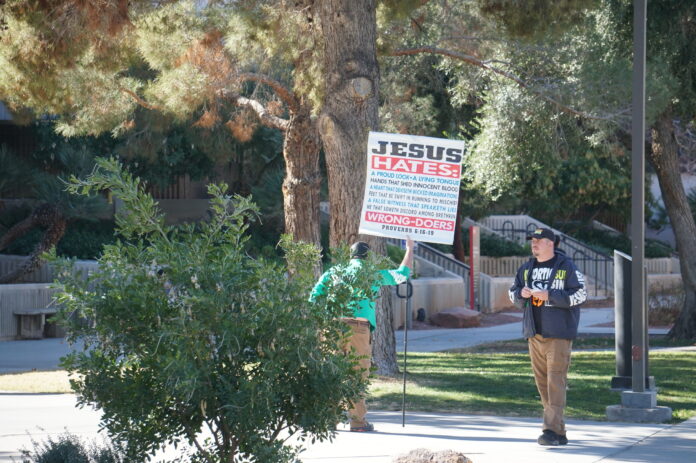Since UNLV is a public institution, anyone can walk on campus at any time, but does that necessarily mean that people should be allowed to protest whatever and whenever they’d like to?
There have always been protests on campus sparked by strong personal beliefs and recent events, such as the ongoing war. Not everyone agrees on everything, so some of these protests can, of course, lead to intense debates.
A heated argument happening on campus is a jarring sight for a lot of people and may offend or make a lot of students uncomfortable. This brings into question what should and shouldn’t be allowed on campus as far as protesting goes.
UNLV professor of journalism and social issues expert Stephen Bates was willing to give his opinion on this very matter.
“Well, you don’t want to stir up actual violence,” said Bates. “Including having people who are offended by a message respond violently to the protestors but, generally speaking, it’s up to security to stop that. To protect the protestors… it’s up to the police to protect them.”
UNLV allows protest and free speech, as long as nobody’s threatened or harassed. This is something that may not sit right with everyone. Especially new students whose first introduction to protest is seen on their very own campus and whose ideas and beliefs may be challenged by a complete stranger.
“They come here from high school where that hasn’t been the case,” said Bates. “It can be a new and different experience and probably, for some of them, unsettling at first.”
Bates digs further into the idea that the price of living in a free society is that you may need to deal with people shouting on your campus and sharing ideas that you don’t necessarily agree with or that you may find offensive. He also shared that UNLV seems to be a bit more closed off and insulated from the situations concerning protests and protestors that may affect other universities. The fact that protests don’t just happen every day may cause people at UNLV to think that it’s that much more jarring to have a protest going on with such strong opinions.
It’s also important to keep in mind that, historically, universities have been breeding grounds for protests and revolt, which may help explain to us why there are so many protests on campus whenever a major national event happens, such as the Israel-Hamas war. Whenever these protests happen, it’s purely a matter of how other students will react and how they choose to act when their ideas are challenged.
It’s not an easy thing to walk through campus and have someone yell and disturb the tranquility of the campus with their beliefs, but it’s their right to do so. UNLV’s rules protect students’ rights to the freedom of speech, and it’s up to the protestors and passersby to react appropriately to one another.
Although there are some alternatives to real-life protesting, like social media activism and general online activism and protest, going out and really doing the thing is what catches the most attention. Everyone has the freedom to voice their opinion, and rightfully so. But we, as students, should also keep in mind the safety and peace of the campus, both of which can be ruined at the drop of a hat.
Uncomfortable discussions and strong personal beliefs shouldn’t prevent people from speaking up. People should be allowed to protest when they see the need for change. Protesting should keep being allowed at UNLV, no matter how outlandish we may think others’ ideas are or how uncomfortable the subject matter may be.


Protesting is fine as long as it is peaceful and does not disrupt. Unfortunately, that is what happened at UNLV a few days ago when an Israeli professor’s talk was disrupted by pro-Palestinian protesters. Apparently, the campus police did nothing since they considered the disrupters to be exercising free speech. Wrong. They were taking away the free speech right of the speaker and his audience. They should have been immediately removed. (They should also be expelled.)
Chalk up another black eye for our universities.